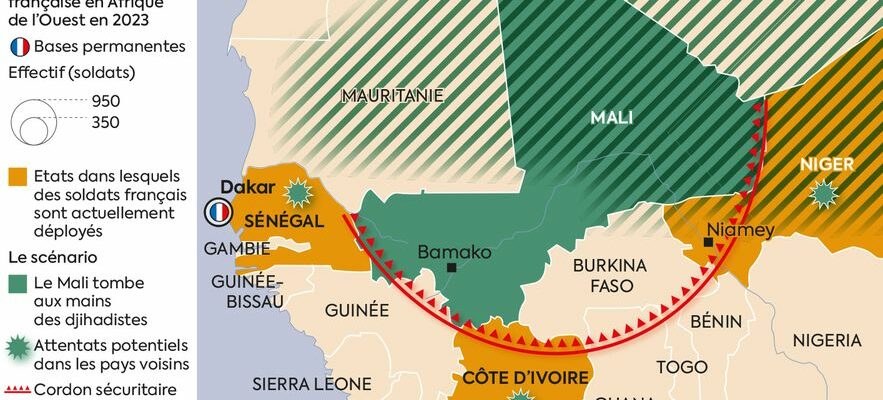In 2013, who could have imagined Daesh, the invasion of Ukraine, the assault on the Capitol? To deal with even the most surprising threats, the Ministry of the Armed Forces has asked the Chiefs of Staff, within the framework of the next military programming law, to detail the dangers hanging over our country. Clearly, to propose credible scenarios justifying the use of force. Independently, L’Express wanted to develop its own “black scenarios” in order to question the preparation, the possible flaws in the French defense, and thus fuel the necessary public debate on these questions at 60 billion euros per year. .
About forty experts – researchers, generals, diplomats, former executives of the DGSE – were asked to deliver their analyzes of the main threats that await France between now and 2030. The framework of these seven scenarios was developed from a real geopolitical tension, to which we have integrated, on the suggestions of our great witnesses, Murphy’s law, himself an American soldier: “Anything that is likely to go wrong will go wrong.” Russia, China, cyber, jihadism… The majority of these hypotheses overlap with those on which the armies are working. These scenarios do not constitute forecasts. The military, considering the worst on principle, are the first to know: it is never certain. Especially if you prepare for it.
Scenario 1: 2026, Russian tanks enter Estonia and Lithuania: “The area is a weak point for NATO”
Scenario 2: 2028: Madagascar takes over the Scattered Islands from France, China pulls the strings
Scenario 3: 2026: four Chinese hypersonic missiles sink the aircraft carrier Charles-de-Gaulle
Scenario 4: Mali falls into the hands of the jihadists
November 2024. The black flag of the jihadists flies over Kati, the garrison town where the president of the Malian junta, Assimi Goïta, resides. The Support Group for Islam and Muslims (GSIM), a subsidiary of Al-Qaeda, captured him and is now heading for Bamako, 15 kilometers away. Malian power, very anti-French since the 2020 coup, refuses to ask for help. “It would be very surprising if the junta appealed to France”, observes Djenabou Cissé, researcher at the FRS (Foundation for Strategic Research). This specialist in the Sahel does not consider “unthinkable” a “takeover of the GSIM”, which, in her opinion, “has local support and strong political influence”. Even if the organization has never placed the exercise of power among its priorities, underlines our expert, it would not refuse the opportunity.
In this scenario, Mali falls into the hands of the jihadists.
© / Map legends
The next day, the GSIM entered the presidential palace of Koulouba, despite the presence of the outdated Wagner militia. “In this case, we would evacuate our nationals”, warns General Bertrand Ract-Madoux, former chief of staff of the army and chief of staff of the DGSE. On November 24, Iyad Ag Ghali, historical leader of the GSIM, proclaims the caliphate of Mali. He delivers a speech in which he “curses the West” and calls for “continuing the jihad”. A possible French intervention is quickly ruled out: the government has not received any call to do so and any request to the UN would be vetoed by Russia. “The capture of Mali by the jihadists is unfortunately a probable scenario, this year or next year, reacts General Dominique Trinquand. Even if Bamako will be difficult for them to take. It is absolutely necessary that our agreements with neighboring countries be reinforced. to stem the threat.
Jihadist sanctuary and migration crisis
Between November 30 and December 20, 2024, attacks took place in Abidjan (Côte d’Ivoire), southern Niger and Senegal. “If asked, France would certainly intervene by setting up sanitary cordons on the borders with Mali, while supporting pockets of Malian resistance,” said Djenabou Cissé. More than 2,000 French soldiers then rush to the Malian borders of Senegal, Côte d’Ivoire and Niger. On January 15, 2025, Ouagadougou, the capital of Burkina Faso, in turn fell into the hands of the GSIM. Then, the terrorists announced that they wanted to expand towards Togo and Benin. “If the Sahelian zone becomes a jihadist sanctuary, the risk is that it will attract fighters, like Daesh a few years ago”, warns Elie Tenenbaum, director of the center for security studies at Ifri (French Institute for International Relations ) and researcher at the Observatory of Future Conflicts.
As in 2015, a major wave of migration is flowing in from the Mediterranean Sea. Intelligence services fear that terrorists are mingling with the refugees. “In order to provoke a crisis, particularly in France, one could even imagine that Yevgueni Prigojine, the boss of Wagner, or someone comparable, finances networks of smugglers in order to create a large-scale emigration movement towards France. ‘Europe”, notes Admiral Pascal Ausseur, director of the Mediterranean Foundation for Strategic Studies.
